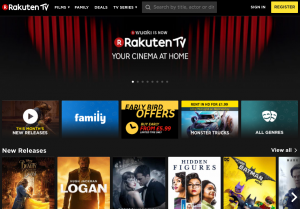Rakuten looks to blockchain to build ‘world’s biggest membership community’
E-commerce giant and – in Europe – video-on-demand provider Rakuten has used Mobile World Congress to unveil a series of initiatives to leverage blockchain technology and content to build “the largest membership community in the world”, in the words of chairman and CEO Hiroshi ‘Mickey’ Mikitani.
 Speaking at Mobile World Congress, Mikitani briefly referenced Rakuten TV, which now has over five million users. However, messaging app Viber is the company’s key content play.
Speaking at Mobile World Congress, Mikitani briefly referenced Rakuten TV, which now has over five million users. However, messaging app Viber is the company’s key content play.
Rakuten has just launched Viber Community, a chat space within the messaging app. Rakuten claims that Viber has one billion members globally, and it now wants to connect Viber with Rakuten ID, its wider e-commerce identifier, allowing it to promote its services across a wider base.
Rakuten has also launched Rakuten Coin, building on its existing loyalty points programme. Rakuten’s aim is for its loyalty points to become a kind of virtual currency that can be exchanged across Rakuten’s other properties. The company will leverage blockchain technology to deliver on its vision.
“We have a dream to become the biggest membership programme, together with blockchain technology and the community programme on top,” he said.
Mikitani said that Rakuten has set the ambition of becoming the largest membership community in the world. It currently has 1.2 billion members and aims to grow this to two billion by 2020. The company’s aim is to enhance the supply of internet services, financial technology and digital content with membership , branding and data, he said.
Mikitani said that Rakuten is “very different from Amazon”, in that it does not want to disconnect brands from consumers but to create a shopping mall of diverse merchants. “We want to be the biggest Grand Bazaar in the world,” he said, through the use of social media functionality such as chat. The company plans to build a global delivery and logistics network to support its aims.
Networks and content are likely to get “closer and closer”, according to Mikitani. “In future the network business could become a commodity,” he said, but owning a network for an e-commerce or content business will make sense as a differentiator.
With this in mind, Rakuten now aims to enter the Japanese mobile market as an MNO. Already, three quarters of the company’s transactions and 86% of traffic comes from mobile, said Mikitani, who claimed “mobile is definitely much more important than desktop”.
The company had previously operated as an MVNO over the NTT DoCoMo network. It has now applied for spectrum to set up its own mobile network.
“I am sure that we will see a lot of these big [content and e-commerce] companies considering getting into the MNO business,” predicted Mikitani.



